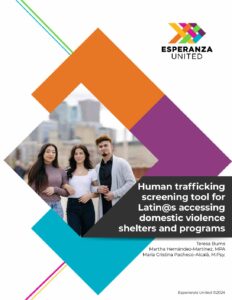New Tool Release
By: Martha Hernández Martínez, MPA and María Cristina Pacheco Alcalá, M.Psy.
Why did we do it?
One of the great lessons we have learned from our advocates is that “a question is never asked for the sake of asking or to fill out a form, if we ask something it is to support, coordinate resources and services for the person and their family.” With that clear lesson in mind, we undertook the initial task of reviewing existing and accessible tools within our network of organizations that focus their efforts on responding to human trafficking.
Without much effort we identified various tools from various groups, which have been used in different regions of the country. However, we noted that there was a gap and a lack of attention to essential elements that we consider fundamental to effectively and equitably serve the Latino community. Through the years Esperanza United (formerly Casa de Esperanza) has identified certain essential elements that serve as a guide for our advocates and are central to the Latina advocacy framework. These elements are patience, being proactive, staying positive, and having a problem-solving attitude, in short, the 4 P’s. These 4 P’s guide our work and facilitate the conditions to provide support and services to survivors of violence and that are necessary in the work against human trafficking.
Without much effort we identified various tools from various groups, which have been used in different regions of the country. However, we noted that there was a gap and a lack of attention to essential elements that we consider fundamental to effectively and equitably serve the Latino community. Through the years Esperanza United (formerly Casa de Esperanza) has identified certain essential elements that serve as a guide for our advocates and are central to the Latina advocacy framework. These elements are patience, being proactive, staying positive, and having a problem-solving attitude, in short, the 4 P’s. These 4 P’s guide our work and facilitate the conditions to provide support and services to survivors of violence and that are necessary in the work against human trafficking.
With this tool we bring the lens of seeing the person as a being with aspirations, dreams and desires, and that it is part of our work to facilitate their development in all areas of their personal well-being. With the plan traced by our 4 Ps, we see that the aspects of safety, family and community, housing, stability and economic resources, health and healing, opportunities to improve their future, become the coordinates to continue on the path of healing.
Who is it for?
This tool was designed for personnel who work in shelters and service centers that serve the Latino community, who have limited resources and who do not have enough time to determine if the survivor they serve has experienced human trafficking. As part of our culture, there is an interest in serving and supporting in a respectful way, and being aware of the culture and barriers that survivors face. The tool provides a series of areas of personal well-being to explore and considerations for evaluating possible indicators of human trafficking. The suggested questions are not invasive. The proposed approach is part of a gradual process where patience, being proactive and positive, and solving problems, become fundamental elements.
What is the expected impact?
We hope that this tool and its content will serve to broaden and diversify the strategies we use in providing services to survivors of human trafficking. We firmly believe that the work is not a mechanical and simplistic one based only on answering a series of questions, reaching the exact number of the identification scale, and following the form and protocol to the letter. Rather, it is creating the space and conditions to establish relationships of trust to know, understand, support, grow and heal. This in a space where survivors are treated with dignity and respect. A space where we support them in achieving their dreams and goals, as part of a process. It is also our way of being consistent in our words and actions, it is not only preaching but the action of being. That is why we say and repeat that survivors are not alone.
Watch our webinar recording below to learn more about this tool. For more access to the tool and the guide, to receive technical assistance and training or any information please send an email to ta@esperanzaunited.org.


